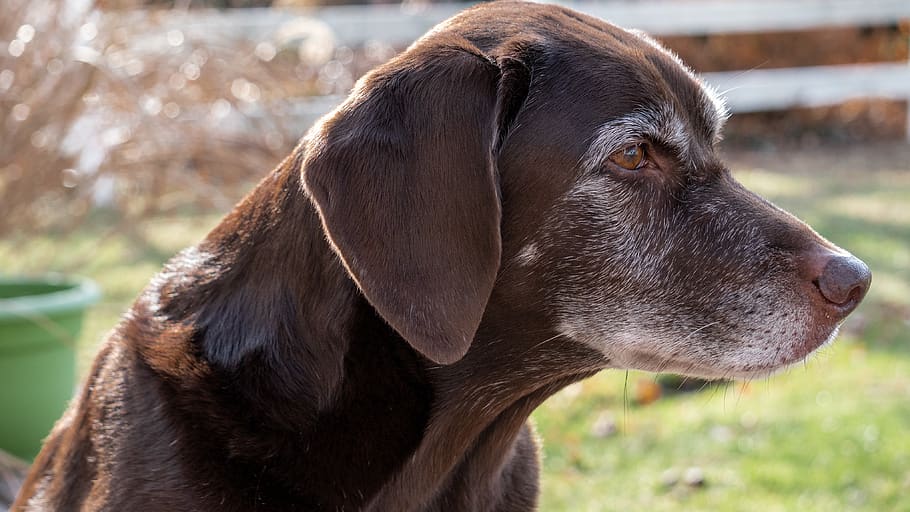Are you trying to figure out if your dog is okay or if they need help? Read this article to learn dog old age symptoms to pay attention to.
We all want our dogs to live forever.
In our eyes, they’ll forever be the puppies they were on the day we first brought them home.
But as much as you want to ignore the fact that your dog is getting up in years, it’s important to keep a realistic eye out for dog old age symptoms that might cause trouble. As our best friends age, we want to make sure they stay comfortable and healthy!
The American Veterinary Medical Association considers a dog a senior at 7 years old, so that’s a good time to start paying closer attention. Here’s how to make sure your dog is healthy for years to come.
Vision Loss
Vision loss is subtle. One sign is cloudiness in the eyes, but because it happens so gradually, you might not notice right away.
Of course, cloudy eyes aren’t always a sign that your dog’s health or vision is worsening. In some dogs, it’s a natural part of the aging process.
If you want to know for sure, pay close attention to your dog’s behavior. If your dog bumps into things, is easily startled, or can’t find the food and water dishes you set out, it might be a sign that their vision is slowly deteriorating. To make things easier on them, try using strategies to help them tell where they are, like different textured rugs to help dogs differentiate parts of your house.
Hearing Loss
Tissue degeneration in the ears isn’t unusual in older dogs. With this change comes hearing loss, which is generally permanent as a dog ages.
As always, one of the best tips for having a healthy dog is prevention. Clean your dog’s ears on a regular basis to keep them healthy, as this may help slow the deterioration.
Slowing Down
Older dogs may have more trouble getting around than their younger counterparts, so watch for signs of mobility issues. They may have trouble climbing the stairs, for example, or jumping into your car or bed.
Slowing down is a natural part of the aging process, but it may also be a result of arthritis. This painful condition can keep your senior dog less active, so it’s important to check in with your vet.
Your vet may recommend certain medications, including finding the best dog hip and joint supplement for senior pups, or they may change your dog’s exercise regimen for arthritis-friendly activities.
Unusual Lumps
Harmless fatty lipomas are common in some dogs, and they only become more common as dogs grow older.
However, it’s a good idea to get new lumps and bumps checked out any time you notice them. You’ll want to rule them out as cancerous tumors. Your vet can help by screening for any lumps during regular checkups, as they may be able to identify deeper lumps that are harder to feel through fur.
Heart Issues
A dog’s heart deteriorates over time, so the risk of heart disease goes up as your dog ages.
While your vet can help track your dog’s heart health during regular check-ups, it’s also important to be on the lookout for any signs of congestive heart failure (CHF). This happens when your dog’s heart can’t pump enough blood, causing the blood to flow into the lungs or stomach.
Signs to look for include persistent coughing, especially at rest or while sleeping, and difficulty breathing. In addition, your dog will tire much more easily than before, or vomit without apparent cause.
CHF can be treated through lifelong medication, but you need to alert your vet as soon as you notice signs of it.
Bad Breath
Bad breath is typical for dogs of any age, and owners are always asking the age-old question of how to tame their dog’s breath.
However, if your dog’s breath worsens suddenly, it could be an indication of more serious dental issues like gum disease or tooth infection. As your dog ages, their immune system can’t fight these relatively minor issues as well as they could when they were small. Reach out for a teeth cleaning from your vet, who may also run some blood work to ensure that the issue isn’t an infection.
Weight Changes
The less active your dog is, especially with the mobility issues we talked about earlier, the more weight they’ll gain. Normally, a little weight gain isn’t an issue, and you can always adjust their diet for a healthier weight.
However, weight loss may be more of an issue. Sometimes, weight loss is simply reduced muscle mass that occurs as your dog slows down, but it could also be an appetite change or digestive issue. If your dog is shedding weight very quickly, talk to your vet to rule out underlying issues.
Incontinence
When your dog forgets their house-training, it may be a frustrating but relatively minor issue. As dogs age, the muscles around the bladder grow weaker, giving them less control of it.
However, it could also be linked to more serious issues. UTIs and kidney diseases are potential problems, or it may be linked to dementia (which we discuss below). If the incontinence occurs multiple times over a short period, talk to a vet to see what’s causing it.
Behavioral Changes
Just like humans, dogs can grow anxious or lose their cognitive function as they grow older. This might show up as frequent barking for no apparent reason, forgotten house-training or dog tricks, or an inability to navigate places your dog has been before.
As always, your vet holds the key to knowing the cause. There’s no cure for dementia if that’s what lies at the root of the behavior, but certain medications and dog foods may help.
Cold and Sniffles
One of the easiest tips for a healthier dog? Keep them warm. Dogs get cold and sick more easily as they age, as they can’t regulate their body temperature as well as they could when they were pups. This may be most obvious in cold weather, where senior dogs are more prone to sniffles and even shivering.
Provide extra blankets and comfort to keep them cozy in cold months, and spread rugs across cool floors. Don’t forget the warm sweaters!
Keep an Eye Out for These Dog Old Age Symptoms
Getting older is tough, and that’s just as true for a dog as it is for a human. One of the best ways to make your aging dog more comfortable in the long run is regular check-ups with the vet to screen for these and other dog old age symptoms. With a little attention and preventative steps, your pup will have a great chance at a long and healthy life.
For more pet care tips to keep your dog healthy, check out the rest of our blog!


